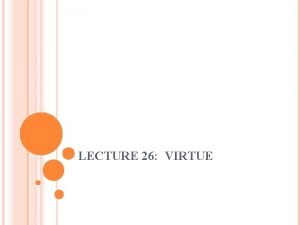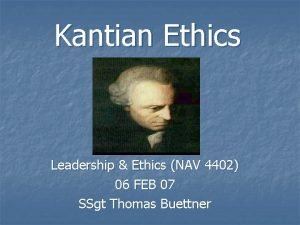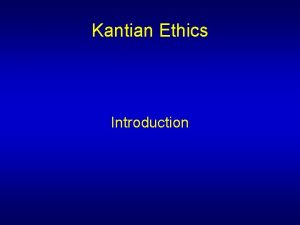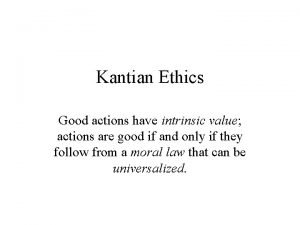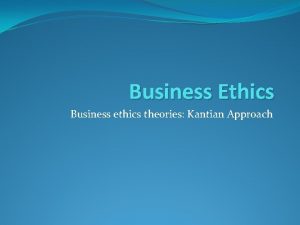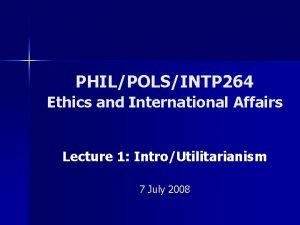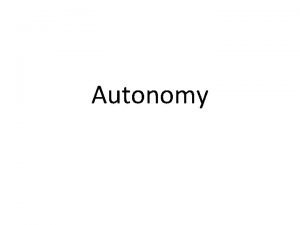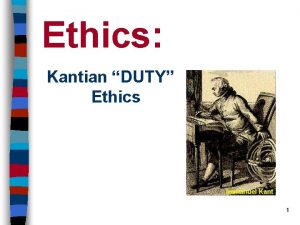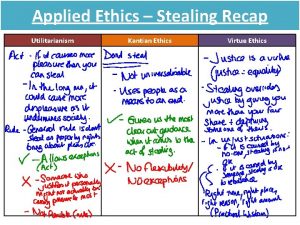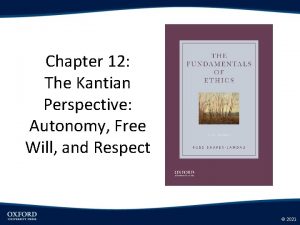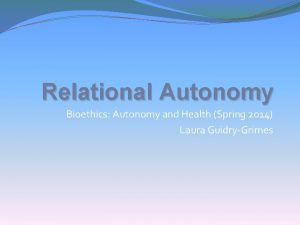Kantian Ethics and Client Autonomy Omar Madhloom University














- Slides: 14

Kantian Ethics and Client Autonomy Omar Madhloom University of Bristol (England) Omar. Madhloom@Bristol. ac. uk

Abstract • This chapter will present a brief outline of deontology and consequentialist theory. The tension between promoting client autonomy and adopting a paternalistic approach to legal practice will be discussed. The chapter will then examine how, using a theoretical approach, students can resolve ethical dilemmas such as conflict of interest and confidentiality, while simultaneously critiquing the role of the state. It will be argued that the current autonomy-centric professional codes fail to provide guidance for students on how to address their own ethical concerns. The current regulatory framework will be analysed an alternative model to reflective practice will be proposed.

Reflective practice • In reflective practice, practitioners engage in a continuous cycle of self-observation and self -evaluation in order to understand their own actions and the reactions they prompt in themselves and in learners (Brookfield, 1995; Thiel, 1999) • ‘Reflective practice…involves thinking about and critically analysing one’s actions with the goal of improving one's professional practice. Engaging in reflective practice requires individuals to assume the perspective of an external observer in order to identify the assumptions and feelings underlying their practice and then to speculate about how these assumptions and feelings affect practice. – Susan Imel, Reflective Practice in Adult Education (1992)

Reflection and Reflexivity These are essential elements of reflective practice. Perceiving the difference makes it less of an ‘illdefined process’ – Bleakley (1999)’From reflective practice to holistic reflexivity’ (1999) 24(3) Studies in Higher Education 215, 317 Reflection - reflection is a method of learning and teaching ‘Active, persistent, and careful consideration of any belief or supposed form of knowledge in the light of the grounds that support it, and the further conclusions to which it tends’ (Dewey, 1933, How We Think, 6) Reflexivity – finding strategies to question our own attitudes, theories-in -use, values, assumptions, prejudices and habitual actions; to understand our roles in relation to others.

Clinical Legal Education (CLE) Reflection turns pro bono work experience into (CLE) RF can enable practitioners to learn from experience about: • Themselves • Their work • Wider society • The way social and cultural structures are formed and control us CLE, similar to substantive modules, cannot teach students every area of law, but through RF, they can gain a deeper insight into the legal issues

Why deontology? Many of the professional code of profession conduct are duty-based Solicitors Regulation Authority: Principle 4, ‘act in the best interests of each client’ SRA does not give guidance in relation to what counts as ‘best interest’ Autonomy Paternalism

Consequentialism and paternalism Clinicians can fall into the trap of focusing on ‘successful’ outcomes for their client The temptation to act in a paternalistic manner – to assume we know what is best for the client and to take that action, even without entirely competent or clear instructions, is often strong

• A number of factors should be addressed including: British Medical Association: Determining 'best interests' • the patient’s own wishes and values (where these can be ascertained), including any advance decision • clinical judgement about the effectiveness of the proposed treatment, particularly in relation to other options • where there is more than one option, which option is less restrictive of the patient’s future choices • the likelihood and extent of any degree of improvement in the patient’s condition if treatment is provided • the views of the parents, if the patient is a child • the views of people close to the patient, especially close relatives, partners, carers, welfare attorneys, court-appointed deputies or guardians • about what the patient is likely to see as beneficial; and • any knowledge of the patient’s religious, cultural and other non-medical views that might have an impact on the patient’s wishes.

Should these be defined by the clinician or the client? Best interests and client autonomy Pro bono clients are from low socio-economic groups; possible issues with competency Consequences on other clients Unqualified commitment to client autonomy? Third parties The wider community/environment

Personal autonomy and moral autonomy According to Beauchamp and Childress’ influential textbook, an autonomous action consists of a competent agent who acts intentionally, with understanding of the relevant information, and in the absence of controlling influences Some philosophers insist on separation of personal autonomy, as a pragmatic bioethical/legal term with marginal moral significance, from “moral autonomy” that requires conscientious transcendence beyond personal interests and desires (Raz, 1986, 370)

Kantian ethics • Kant’s educational philosophy is achievable for both the individual student and also on a large scale. it focuses on developing three key aspects of students that draw on capacities within the student and that are developed in community with others: 1. a robust will bent towards the good; 2. good and skilled moral judgment; and 3. a commitment to the wider community.

Client-centred relationship • Robert Dinerstein, rejecting paternalism: • ‘Client-centred relationships entail shared decisionmaking responsibility and mutual participation by lawyer and client. By avoiding the trap of either or client-dominance, these relationships provide greater opportunities for facilitating a wise client decision in a supportive atmosphere’. – ‘Clientcentred counselling: reappraisal and refinement’ (1990) 32 Arizona law review 501, 541

Promoting happiness of others • Kant says we have a duty to work for other people’s happiness because: • ‘Adversity, pain, and want are great temptations to violate one’s duty. It might therefore seem that prosperity, strength, health, and well-being in general, which check the influence of these, could also be considered ends that are duties, so that one has a duty to promote one’s own happiness and not just the happiness of others. —But then the end is not the subject’s happiness but his morality, and happiness is merely a means for removing obstacles to his morality—a permitted means’ - Kant, Metaphysics of Morals, 6: 388

Kant’s heuristics such as the categorical imperative and his description of our duties to ourselves and to others do not specifically tell us how to act in each scenario. Kant’s Categorical Imperative They outline general guiding rules for acting or not acting. Kant’s heuristics tell us that we must act only on maxims that are universalizable, and he tells us that we have duties to protect the dignity of ourselves and of others. He does not tell us which specific actions in specific situations meet these criteria. In order to determine this, students must learn to connect their particular situations with these rules. In other words, they need to learn to judge properly.
 Manaar yusuf omar
Manaar yusuf omar Kant’s ethical theory
Kant’s ethical theory Kantian vs utilitarian ethics
Kantian vs utilitarian ethics Utilitarianism vs virtue ethics
Utilitarianism vs virtue ethics Kantian ethics vs utilitarianism
Kantian ethics vs utilitarianism Example of kantianism
Example of kantianism Imperativo hipotético
Imperativo hipotético Kantian ethics vs utilitarianism
Kantian ethics vs utilitarianism A kantian approach to business ethics
A kantian approach to business ethics Ethics a basic framework
Ethics a basic framework Kantian ethics
Kantian ethics Immanuel kant
Immanuel kant Effciency
Effciency Client léger client lourd
Client léger client lourd Example of two tier architecture
Example of two tier architecture



